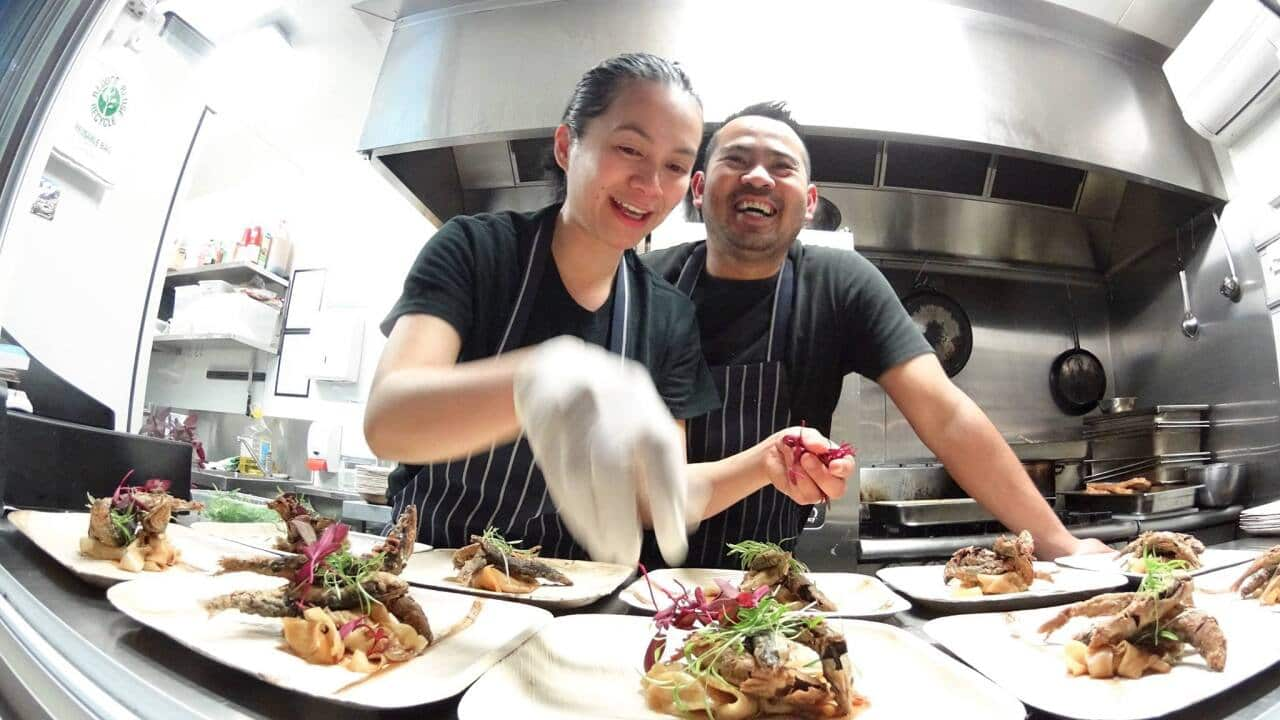Filipino chef Glaiza Victor-Calderon has been around the world, working in vastly different locations and kitchens for more than 15 years.
"I worked in the US as a commis chef for Marriott, but I had a hard time working in the city. I worked in the Great Barrier Reef and Maldives before that - both remote island resorts. I missed working remote so I went back to it after trying to work in the city." Her desire to return to working remotely led to a stint as a chef in the Western Australian mines, which then opened the door to becoming head in the kitchen at the Karijini Eco Retreat located at the Karijini National Park.
Her desire to return to working remotely led to a stint as a chef in the Western Australian mines, which then opened the door to becoming head in the kitchen at the Karijini Eco Retreat located at the Karijini National Park.

"I missed working remote so I went back to it after trying to work in the city." Source: Glaiza Victor-Calderon

Karijini National Park Source: Paul Pichugin Photography / Karijini Eco Retreat
Bush tucker cooking
"I found out about Karijini through a bush tucker chef who I met at the mines and used to work in the retreat. Bush tucker cooking is native and traditional cooking in Australia practised by the Aboriginal people. They use native ingredients and meats in their dishes, based on availability and season."
Native ingredients used in bush tucker cooking include bush tomatoes, lemon myrtle and quandong, as well as crocodile, barramundi, kangaroo and emu. Glaiza credits the Aboriginal elders for teaching her the nuances and intricacies of bush tucker cooking.
Glaiza credits the Aboriginal elders for teaching her the nuances and intricacies of bush tucker cooking.

Wild Rosella [left] and barramundi [right] are bush food. Source: Karijini Eco Retreat
"As a chef, I'm always interested in the cuisine of whatever place I am in. When I first came to Australia, I really wanted to learn the cuisine of the country," she shares.
"For you to able to extend your reach to the ingredients of the Aboriginal people, you have to be granted permission. They're the ones who teach you what's safe to eat, where and how to prep. Being one of the chosen chefs and being Filipino, it's such a privilege for me to be allowed to learn this and to be welcomed as a bush tucker chef."

The restaurant at the Karijini Eco Retreat serves emu steak, a bush delicacy. Source: Karijini Eco Retreat
Filo in the bush
In as much as Glaiza takes pride in being a bush tucker chef, she too aims to promote her own Filipino cuisine.
"Karijini is owned by the Banjima people and because of this, the menu I create for the restaurant has to be approved by them," she shares, adding: "Due to the demand and limited supply of ingredients, as well as my love for Filipino cuisine, I gave our dishes a Filipino and Asian twist. When I came to Australia, it was really my goal to blend Filipino and Australian cooking." Some of the Filipino-inspired bush tucker dishes that Glaiza has created for the restaurant include kangaroo mechado (tomato-based stew), daing na barramundi (fish marinated in vinegar, salt and peppercorns), crocodile adobo sa gata (braised meat in soy sauce, vinegar and coconut milk), Filipino-style barbecued meats and buko pandan (dessert with jelly, young coconut and cream).
Some of the Filipino-inspired bush tucker dishes that Glaiza has created for the restaurant include kangaroo mechado (tomato-based stew), daing na barramundi (fish marinated in vinegar, salt and peppercorns), crocodile adobo sa gata (braised meat in soy sauce, vinegar and coconut milk), Filipino-style barbecued meats and buko pandan (dessert with jelly, young coconut and cream).

The restaurant at Karijini Eco Retreat Source: Karijini Eco Retreat
"Of course the majority of our dishes we serve with rice," Glaiza laughs.
"Our guests like the food - they get surprised because they don't expect Asian-inspired dishes. They ask me how I came up with them and I tell them that these are dishes I grew up eating."
For Glaiza, the dishes she grew up eating and the bush tucker food she's come to learn and love are quite similar. "It's really rewarding and surprising when you try to incorporate local ingredients into Filipino cuisine, and you discover how similar our traditional ways of cooking are," she says.
"It's really rewarding and surprising when you try to incorporate local ingredients into Filipino cuisine, and you discover how similar our traditional ways of cooking are," she says.

"It's really rewarding and surprising when you try to incorporate local ingredients into Filipino cuisine." Source: Destination WA
"The Filipino way of cooking and getting together with family, they also practice that. You cook a feast and everyone gets together and celebrates. Being outside the Philippines and still being able to cook Filipino food - it reminds me of home."
ALSO READ / LISTEN TO













